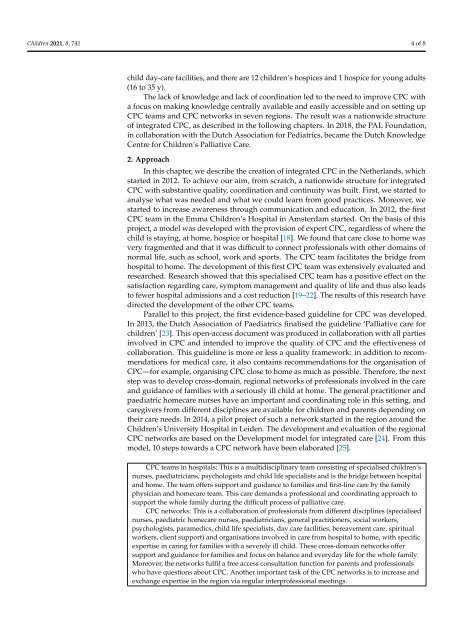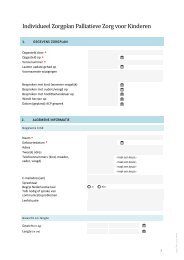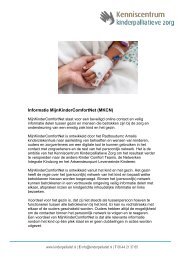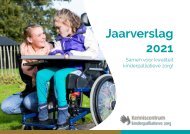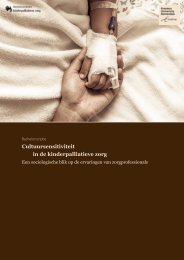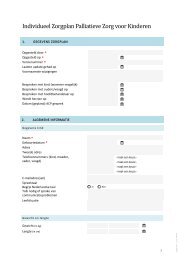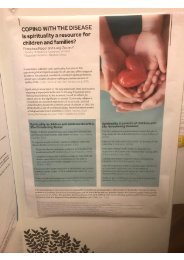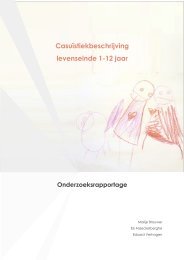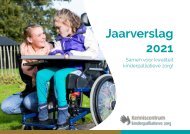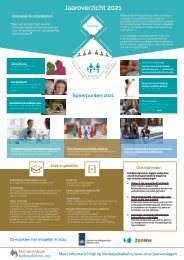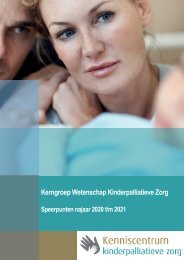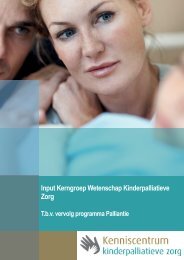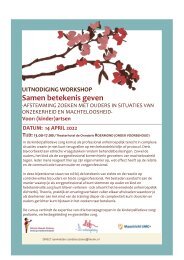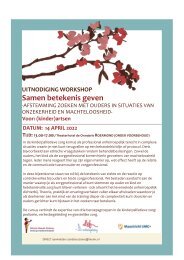Development of the Dutch Structure for Integrated Children’s Palliative Care
You also want an ePaper? Increase the reach of your titles
YUMPU automatically turns print PDFs into web optimized ePapers that Google loves.
Children 2021, 8, 741 4 <strong>of</strong> 8<br />
child day-care facilities, and <strong>the</strong>re are 12 children’s hospices and 1 hospice <strong>for</strong> young adults<br />
(16 to 35 y).<br />
The lack <strong>of</strong> knowledge and lack <strong>of</strong> coordination led to <strong>the</strong> need to improve CPC with<br />
a focus on making knowledge centrally available and easily accessible and on setting up<br />
CPC teams and CPC networks in seven regions. The result was a nationwide structure<br />
<strong>of</strong> integrated CPC, as described in <strong>the</strong> following chapters. In 2018, <strong>the</strong> PAL Foundation,<br />
in collaboration with <strong>the</strong> <strong>Dutch</strong> Association <strong>for</strong> Pediatrics, became <strong>the</strong> <strong>Dutch</strong> Knowledge<br />
Centre <strong>for</strong> <strong>Children’s</strong> <strong>Palliative</strong> <strong>Care</strong>.<br />
2. Approach<br />
In this chapter, we describe <strong>the</strong> creation <strong>of</strong> integrated CPC in <strong>the</strong> Ne<strong>the</strong>rlands, which<br />
started in 2012. To achieve our aim, from scratch, a nationwide structure <strong>for</strong> integrated<br />
CPC with substantive quality, coordination and continuity was built. First, we started to<br />
analyse what was needed and what we could learn from good practices. Moreover, we<br />
started to increase awareness through communication and education. In 2012, <strong>the</strong> first<br />
CPC team in <strong>the</strong> Emma <strong>Children’s</strong> Hospital in Amsterdam started. On <strong>the</strong> basis <strong>of</strong> this<br />
project, a model was developed with <strong>the</strong> provision <strong>of</strong> expert CPC, regardless <strong>of</strong> where <strong>the</strong><br />
child is staying, at home, hospice or hospital [18]. We found that care close to home was<br />
very fragmented and that it was difficult to connect pr<strong>of</strong>essionals with o<strong>the</strong>r domains <strong>of</strong><br />
normal life, such as school, work and sports. The CPC team facilitates <strong>the</strong> bridge from<br />
hospital to home. The development <strong>of</strong> this first CPC team was extensively evaluated and<br />
researched. Research showed that this specialised CPC team has a positive effect on <strong>the</strong><br />
satisfaction regarding care, symptom management and quality <strong>of</strong> life and thus also leads<br />
to fewer hospital admissions and a cost reduction [19–22]. The results <strong>of</strong> this research have<br />
directed <strong>the</strong> development <strong>of</strong> <strong>the</strong> o<strong>the</strong>r CPC teams.<br />
Parallel to this project, <strong>the</strong> first evidence-based guideline <strong>for</strong> CPC was developed.<br />
In 2013, <strong>the</strong> <strong>Dutch</strong> Association <strong>of</strong> Paediatrics finalised <strong>the</strong> guideline ‘<strong>Palliative</strong> care <strong>for</strong><br />
children’ [23]. This open-access document was produced in collaboration with all parties<br />
involved in CPC and intended to improve <strong>the</strong> quality <strong>of</strong> CPC and <strong>the</strong> effectiveness <strong>of</strong><br />
collaboration. This guideline is more or less a quality framework: in addition to recommendations<br />
<strong>for</strong> medical care, it also contains recommendations <strong>for</strong> <strong>the</strong> organisation <strong>of</strong><br />
CPC—<strong>for</strong> example, organising CPC close to home as much as possible. There<strong>for</strong>e, <strong>the</strong> next<br />
step was to develop cross-domain, regional networks <strong>of</strong> pr<strong>of</strong>essionals involved in <strong>the</strong> care<br />
and guidance <strong>of</strong> families with a seriously ill child at home. The general practitioner and<br />
paediatric homecare nurses have an important and coordinating role in this setting, and<br />
caregivers from different disciplines are available <strong>for</strong> children and parents depending on<br />
<strong>the</strong>ir care needs. In 2014, a pilot project <strong>of</strong> such a network started in <strong>the</strong> region around <strong>the</strong><br />
<strong>Children’s</strong> University Hospital in Leiden. The development and evaluation <strong>of</strong> <strong>the</strong> regional<br />
CPC networks are based on <strong>the</strong> <strong>Development</strong> model <strong>for</strong> integrated care [24]. From this<br />
model, 10 steps towards a CPC network have been elaborated [25].<br />
CPC teams in hospitals: This is a multidisciplinary team consisting <strong>of</strong> specialised children’s<br />
nurses, paediatricians, psychologists and child life specialists and is <strong>the</strong> bridge between hospital<br />
and home. The team <strong>of</strong>fers support and guidance to families and first-line care by <strong>the</strong> family<br />
physician and homecare team. This care demands a pr<strong>of</strong>essional and coordinating approach to<br />
support <strong>the</strong> whole family during <strong>the</strong> difficult process <strong>of</strong> palliative care.<br />
CPC networks: This is a collaboration <strong>of</strong> pr<strong>of</strong>essionals from different disciplines (specialised<br />
nurses, paediatric homecare nurses, paediatricians, general practitioners, social workers,<br />
psychologists, paramedics, child life specialists, day care facilities, bereavement care, spiritual<br />
workers, client support) and organisations involved in care from hospital to home, with specific<br />
expertise in caring <strong>for</strong> families with a severely ill child. These cross-domain networks <strong>of</strong>fer<br />
support and guidance <strong>for</strong> families and focus on balance and everyday life <strong>for</strong> <strong>the</strong> whole family.<br />
Moreover, <strong>the</strong> networks fulfil a free access consultation function <strong>for</strong> parents and pr<strong>of</strong>essionals<br />
who have questions about CPC. Ano<strong>the</strong>r important task <strong>of</strong> <strong>the</strong> CPC networks is to increase and<br />
exchange expertise in <strong>the</strong> region via regular interpr<strong>of</strong>essional meetings.


